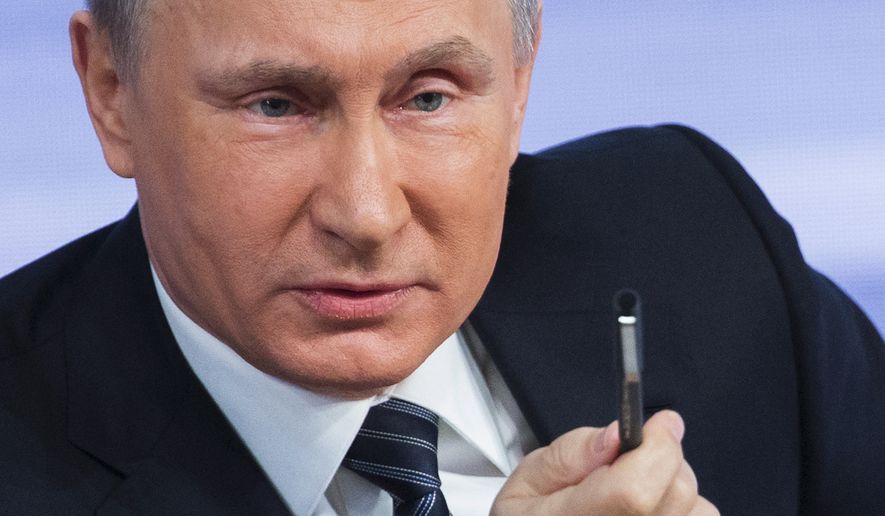ANALYSIS/OPINION:
Russian President Vladimir Putin lived through the collapse of the Soviet Union, a fact often noted by pundits when attempting to offer a glimpse into his view of the world. However, Mr. Putin also lived through the Russian default and financial collapse of 1998, and both events have seared certain lessons into his psyche.
The onetime KGB operative is often quoted as lamenting that “the collapse of the Soviet Union was a major geopolitical disaster of the century.” But it was not just the loss of geopolitical power that shocked Mr. Putin. It was the financial weakness that helped bring down the Soviet giant. You can see the lessons Mr. Putin learned in how he deals with financial realities that confront his country today.
First of all, the Kremlin paid down most of Russia’s sovereign debt and kept it low, well under 20 percent of gross domestic product. In fact, during the boom years, Russia issued bonds only to basically maintain access to the debt capital markets and to price Russian risk. In contrast, the most developed Western nations are at debt-to-GDP levels that historically have been where markets begin to question their will to pay back their obligations, with a financial crisis to follow. The financial irresponsibility in the West is astounding.
Mr. Putin has built up Russian foreign currency reserves to high levels and has found those reserves comforting and indispensable in recent financial downturns. Even in the face of the current crisis, where economic sanctions and the collapse in world energy prices have weakened the ruble and damaged Russia’s credit rating, the central bank has given up trying to support the currency and in recent days actually increased reserves.
Don’t get me wrong — I’m not saying Mr. Putin has done what is best for the Russian economy. The Kremlin’s failure to diversify away from a reliance on hydrocarbon production may well lead to a third Russian financial collapse and an eventual change in power.
But Mr. Putin understands that his people will suffer quietly amid cutbacks in social services. In Russia, suffering is an art form. What he cannot afford is to be seen as weak in the eyes of the voters or to fall victim again to global currency speculators. That failure will not be forgiven by a population eager to see Russia restored to greatness again.
Today, Mr. Putin is once again showing his financial savvy by talking up the price of crude oil on global markets while maintaining a high level of production. Russia cannot afford to cut its output of oil and natural gas and risk losing foreign customers.
The constant, timely rays of sunshine fed to the commodity markets in the form of a promise of a coming “deal” that will cap or maybe even cut production is a masterful manipulation of Wall Street. When you marry this savvy with the leadership to get other OPEC producers to go along, it’s a brilliant maneuver to make the most of a weak hand.
Along with a single-minded focus to use Russia’s resurgent military capability to achieve geographical and geopolitical gains, Mr. Putin’s grasp and manipulation of the financial markets make him a formidable adversary. One may not agree with his tactics and behavior from a moral or ethical sense, but you have to admire a master of the great game.
If you haven’t noticed, in the face of predictions from the talking heads of Russia’s imminent collapse, the price of crude has stabilized in the mid-$30s, well north of the $15 range analysts were predicting. Expect more “rumors” of production cuts and OPEC “agreements” to keep the market stabilized until the supply overhang in the crude market is reduced and prices rise further.
Yes, Mr. Putin has played a financially weak hand very well.
• L. Todd Wood, a former U.S. military helicopter pilot and Wall Street debt trader, is a contributor to Fox Business, the National Review and many other publications. He can be reached through his website, LToddWood.com.
• L. Todd Wood can be reached at ltwood@123washingtontimes.com.




Please read our comment policy before commenting.